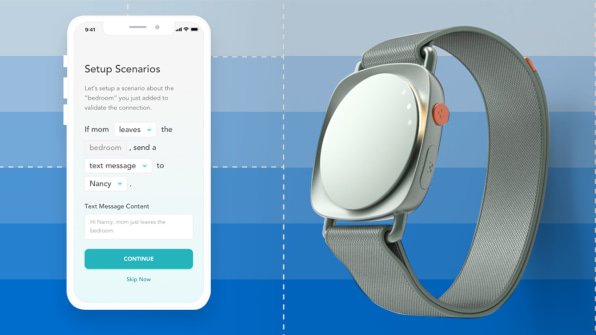Students from IIT Institute of Design (ID) worked with CareBand to develop a design for the CareBand wearable to destigmatize dementia. Professor Martin Thaler mentored the student project in his product design workshop. Martin Thaler co-founded several successful design consulting firms, worked with major companies such as Motorola and McDonald’s, and sponsored by Capital One, Logitech, and Target. The ID students and Martin Thaler submitted their project for the FastCompany 2021 Innovation by Design Awards competition and received honorable mention for the Best Student Design of 2021.
The FastCompany 2021 Innovation by Design Awards honors businesses and designs solving real-world problems. The competition brings in top designers and leaders in business to judge the design projects on 7 key components: “functionality, originality, beauty, sustainability, user insight, cultural impact, and business impact”. This year was the 10th anniversary of the FastCompany 2021 Innovation by Design Awards competition.
The students working on the project- Haiping Liao (MDes 2021), Jason Zhang (MDes 2022), Nanxi Yu (MDes 2021), and Siyan Zhou (MDes 2021)- aimed to create a friendly interface for the CareBand to empower people living with dementia. They wanted to enhance the user’s experience starting from the moment the package is opened.
First, the ID students interviewed the people with dementia and their families to learn what the users desired for the product. Following the interviews, they developed 4 key principles for the project: conversational, respectful, transparent, and connected. These principles would make the product easy to understand, personalized, and help improve social interactions. The students also hoped to address other specific challenges that were brought to their attention during the interviews such as user support, autonomy, dementia stigmatization, and caregiver burden.
The redesign of the product clearly demonstrates to the user how the different components of the product work together using a “flat map” during the unboxing. The plates are interchangeable and can be customized. This abides by the respectful, transparent, and conversation principles. The CareBand arrives with beacons used to demarcate different rooms in the user’s home or to precisely monitor location and movement.
The design also addressed the other problems of autonomy, stigma, and caregiver burden. The students gave the user their autonomy back by presenting the device to them in a way they can understand and set up themselves instead of a caregiver or family member performing the task for them. The emergency button is placed discreetly on the side of the CareBand to reduce stigma and not categorize the users as patients which should be avoided at all times when referring to people with Alzheimer’s disease and related dementias. Finally, the CareBand would reduce caregiver burden with an app the caregiver can use to monitor their patients and receive phone notifications if the user exits the home to avoid wandering, endangerment or the user becoming lost.
Adam Sobol, the CEO of CareBand, states, “The students truly blew me away. I am thrilled and excited by these insights and ideas. I am impressed that they went from knowing very little about dementia and caregiving just a few short weeks ago to now really understanding the challenges associated with living with dementia and providing care.” CareBand is continuing to work with Martin Thaler and his new cohort of students for another project in his product design workshop.





